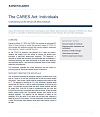Review provisions that include aid for industries, tax law changes and credits.
Passed on March 27, 2020, the CARES Act provides an estimated $2 trillion in fiscal stimulus to combat the economic impact of COVID-19 and provides the healthcare industry the financial support, equipment and protection it needs to combat the virus.
Below, review some of the major provisions in the CARES Act related to industry support, business taxes and more.
General economic support
The relief bill allocates a $500 billion fund to help the hardest-hit businesses and industries. This includes $454 billion in loans and guarantees investments in programs to eligible businesses, including airlines, air cargo carriers, integral national security businesses, states and municipalities. The Treasury can also use a credit fund to purchase obligations or other interests directly from issuers or from the secondary market to provide liquidity where needed.
It also provides payroll protection grants to protect airline and air cargo employees and contractors and keep workers employed for when normal business levels resume. Further support for airlines includes suspension of certain air travel and aviation fuel excise taxes through January 1, 2021. Compensation for these loans include interest and equity stakes in airlines if needed by warrants, stock options, or common or preferred stock.
There will be restrictions on executive compensation for certain officers and employees. Companies can’t buy back their own shares or pay out dividends until one year after the loan is repaid. Airlines that receive loans must maintain service routes and destinations.
Some other businesses essential in keeping the economy moving that are eligible for funds include the United States Postal Service (USPS), airports, mass transit systems and Amtrak. There are also funds allocated for emergency appropriations for government agency response efforts.
Payroll tax deferral
A key provision of the stimulus bill provides employers the ability to delay the payment of employer payroll taxes until December 31, 2021. At that time, half of the payroll tax will be due with the rest due by December 31, 2022. This is intended to try to alleviate the burden on employers who have struggled to make payroll. This also includes self-employed individuals. Businesses that take out paycheck loans may not be eligible for this deferral.
Net operating loss (NOL) carry back
Businesses will be able to carry back NOLs again, which were allowed prior to the 2017 Tax Cuts and Jobs Act. The NOL carry back option allows businesses to use the losses against prior year income, which helps to reduce prior year income and claim refunds. The 2017 tax act disallowed the option to use an NOL for prior years and only to be carried forward indefinitely (offsetting income in future years).
The CARES Act allows businesses to use their 2018, 2019 or 2020 NOL to be carried back up to five years, which could provide refunds to some businesses needing cash. Another provision changes the amount of the NOL that could be used against income. Under the 2017 tax act, businesses could only use an NOL to offset 80% of taxable income, whereas the CARES Act allows businesses to offset up to 100% of taxable income for 2018, 2019 and 2020.
The CARES Act also removes the 2017 tax act’s limitation on business losses for non-corporations. Businesses should speak with their CPA to discuss the use of prior year NOLs or suspended losses.
Qualified improvement property correction
The act also corrects an element of the 2017 tax act that prevented some businesses with “qualified improvement property” – defined as improvements made to the interior of nonresidential buildings – from claiming accelerated (bonus) depreciation for business investment. It was intended to allow businesses to take depreciation quicker and lower taxable income to provide an incentive for investment, but this new category of “qualified improvement property” was left out. Now, a business with this category of property may file amended tax returns to claim this benefit, which may provide a tax refund. Businesses that could benefit from this include real estate owners, restaurants and retail businesses.
Employee retention credit
The act provides an employee retention credit for qualified businesses with reduced revenue due to government restrictions in COVID-19. Operations must have been fully or partially suspended and gross receipts (revenue) must have declined by more than 50% compared to the same quarter in the prior year. The credit is equal to up to 50% of qualified wages up to $10,000 (including health benefits) per employee, resulting in a maximum credit of $5,000 per employee.
There are different stipulations for different business sizes based on qualified wages and number of employees (less than 100 or 100 or more). Any wages used for the new payroll tax credit for family leave or sick leave in previous coronavirus bills or used for SBA paycheck protection program cannot be used.
Other notable provisions
Another provision includes a temporary increase of limits on business interest expenses from 30% to 50% of adjusted taxable income for tax years 2019 and 2020. This provides higher deductions, which lowers taxable income. The charitable deduction limit also increased from 10% of adjusted taxable income to 25%.
Your financial advisor and tax professional can provide more information about how the CARES Act affects you directly.
Read the full whitepaper:
The CARES Act: Small Businesses
Raymond James and its advisors do not offer tax or legal advice. You should discuss any tax or legal matters with the appropriate professional.
Markets & Investing Members of the Raymond James Investment Strategy Committee share their views on...
Markets & Investing Review the latest Weekly Headings by CIO Larry Adam. Key Takeaways ...
Technology & Innovation Learn about a few simple things you can do to protect your personal information...
